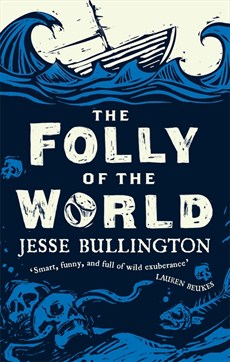The Under the Radar series is our chance to highlight books that we believe have gone unjustly unnoticed—recent books that, through quirks of time and space, have somehow slipped through the cracks.
Jesse Bullington’s The Folly of the World (2012) is almost wholly indescribably, so, be warned, although I’m approaching this with great enthusiasm, there’s not a lot of detail involved. At the highest, most hand-wavey conceptual level, Folly is about, I suppose, quirks. And also time. And hey, even a bit of space. And it is definitely about slipping through the cracks—physically, in society and in reality itself.
Is that a little too vague? I’ll start over.
In 1421, storms in the North Sea caused one of the largest floods in history. Entire villages in the Netherlands disappeared overnight, completely wiped out by the sudden rushes of water. The death toll is unknown, but according the ever-reliable ancient text Wikipedia, it was in the thousands—if not tens of thousands. The catastrophe reshaped the landscape both politically and geographically.
Meanwhile, in the upper reaches of Flemish society, the noble classes are dividing between the Cod and the Hook factions. A simmering resentment has turned into a civil war, dividing cities and families. (And, frankly, who doesn’t love a plot summary that contains “Meanwhile, in the upper reaches of Flemish society…”)
Against this background—war and destruction—we find three opportunistic adventurers. Sander is a thuggish killer, Jan is a manipulative nobleman and Jo is a peasant girl who can swim like a fish. The latter is extremely significant: Jan needs Jo to fetch something for him from one of the drowned villages. Somewhere under the murky waters, there is a ring—a ring that will be his ticket into the upper reaches of society. The three make unlikely allies, but, however reluctantly, they make a good team. Jan teaches Jo that she can dream of—and achieve—more than just survival, Jan softens Sander’s hard edges and all of them learn bit (but not too much) about trust. Lest this be mistaken for a Disney After School special, there’s also a lot of sex. And flesh-eating eels.
Although the quest is simple, the politics are brutal—and not only the raging class war. Sander, Jan, and Jo trade vicious jibes (and worse) as they grow more attached, and therefore more exposed, to one another. In a world that’s chaotic, dirty and merciless, these three must lower themselves (literally and figuratively) in order to succeed.
So… I’ve now described The Folly of the World twice: once in the most abstract possible terms, once in the most specific. And neither summary does this book justice.
Because, amongst other things, I have no idea what really happens in Folly. Oh, certainly I have a theory, and I’ve argued it blue with such luminaries as Lauren Beukes and my own wife, both of whom have their own interpretations of the book’s events. Annoyingly, all of our theories are based on major spoilers, so I can’t even hint at them here. Except that this book is either extraordinarily supernatural, extraordinarily supernatural in a completely different way or perhaps not even a fantasy at all. Or something else entirely. And, to his credit, Bullington doesn’t give us the answers. Folly is a book that not only trusts its readers, it deliberately provokes them. It encourages us to draw our own conclusions, a maneuver that’s confident, brave and, in this case, a sign of true excellence.
Similarly, Folly has ridiculous depth. Lest my wibbling above scare you away—Folly can be enjoyed simply as a (filthy) historical quest fantasy. There’s plenty of comedy, sex, and violence to make this a crowd-pleaser. But Folly also provides a lens by which we can examine our notions of class, sex, love, and destiny. Come for the monster eels, Lovecraftian Belgians, and vicious swordfights, but stay for the insightful discussion of social mobility.
I may not be able to describe The Folly of the World, but I can wholeheartedly recommend it: Jesse Bullington’s writing is grotesquely beautiful and immeasurably fun.
…and yet, still under the radar.
Check out this crazy press release from Orbit announcing Bullington’s first book, The Brothers Grossbart, Gail Carriger’s Soulless and N.K. Jemisin’s The Hundred Thousand Kingdoms (plus one of Abercrombie’s finest, just for kicks). It is the Class of ’83 all over again. And, like his peers in this astounding group, Bullington deserves all the recognition he can get. This is an author that can create a non-linear 15th century Flemish quest fantasy and make it both fascinating and fun. Anyone who can achieve that deserves as much acclaim as possible.
The Folly of the World is available from Orbit
Jared Shurin has eaten eels twice, once as sushi, once in a pie. He thinks that being horrified of them is completely justified.










